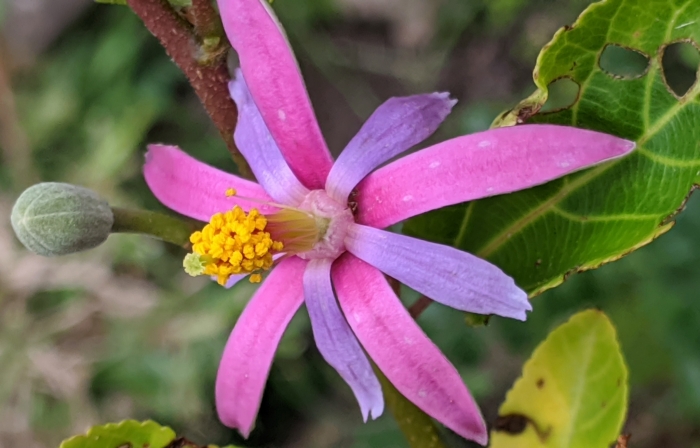Crossberry
(Grewia occidentalis)
Crossberry (Grewia occidentalis)
/
/

Nicola van Berkel
CC BY-SA 4.0
Image By:
Nicola van Berkel
Recorded By:
Copyright:
CC BY-SA 4.0
Copyright Notice:
Photo by: Nicola van Berkel | License Type: CC BY-SA 4.0 | License URL: http://creativecommons.org/licenses/by-sa/4.0/ | Rights Holder: Nicola van Berkel | Publisher: iNaturalist | Date Created: 2020-05-09T13:25:37-07:00 |





















































Estimated Native Range
Summary
Grewia occidentalis, commonly known as Crossberry, is a small, scrambling, deciduous shrub native to the woodland, forest edges, and savanna regions of Southern Africa. It typically reaches a height of about 3 meters and is known for its purple, star-shaped flowers that bloom in summer. The flowers are quite showy and are followed by distinctive four-lobed berries, which are shiny reddish-brown and remain on the plant for extended periods. These fruits are a favorite of fruit-eating birds, contributing to the shrub’s role in the local ecosystem. The leaves of Grewia occidentalis are simple, shiny, deep green, and sometimes slightly hairy, adding to the plant’s ornamental value.
Crossberry is valued for its hardiness, drought tolerance, and ability to attract wildlife, including butterflies and birds. It is suitable for planting near buildings and paving due to its non-aggressive root system. In gardens, it is used for border planting, as a specimen shrub, or for wildlife gardens. It thrives in full sun to part shade and prefers soils with medium to fast drainage. While it can tolerate light frost, it does best in warmer climates. Propagation is typically done from seed, but germination can be erratic; it is often improved if seeds pass through the digestive system of animals, mimicking its natural dispersal by monkeys. Care should be taken with watering, as it does not require high amounts of water once established.CC BY-SA 4.0
Crossberry is valued for its hardiness, drought tolerance, and ability to attract wildlife, including butterflies and birds. It is suitable for planting near buildings and paving due to its non-aggressive root system. In gardens, it is used for border planting, as a specimen shrub, or for wildlife gardens. It thrives in full sun to part shade and prefers soils with medium to fast drainage. While it can tolerate light frost, it does best in warmer climates. Propagation is typically done from seed, but germination can be erratic; it is often improved if seeds pass through the digestive system of animals, mimicking its natural dispersal by monkeys. Care should be taken with watering, as it does not require high amounts of water once established.CC BY-SA 4.0
Plant Description
- Plant Type: Shrub
- Height: 1-4 feet
- Width: 2-5 feet
- Growth Rate: Rapid
- Flower Color: Purple, Pink
- Flowering Season: Spring, Summer, Fall
- Leaf Retention: Evergreen
Growth Requirements
- Sun: Full Sun, Part Shade
- Water: Low, Medium
- Drainage: Medium, Fast
Common Uses
Bird Garden, Butterfly Garden, Groundcover, Hedges, Low Maintenance, Street Planting
Natural Habitat
Woodland, forest edges, and savanna regions of Southern Africa
Other Names
Common Names: Lavender Starflower, Kreuzbeere, Korsgrewia, Cross-Berry
Scientific Names: , Grewia occidentalis, Grewia occidentalis var. littoralis, Grewia occidentalis subsp. litoralis, Grewia microphylla, Grewia obtusifolia, Grewia trinervis, Grewia chirindae, Grewia seringeana, Grewia ulmifolia,
GBIF Accepted Name: Grewia occidentalis L.